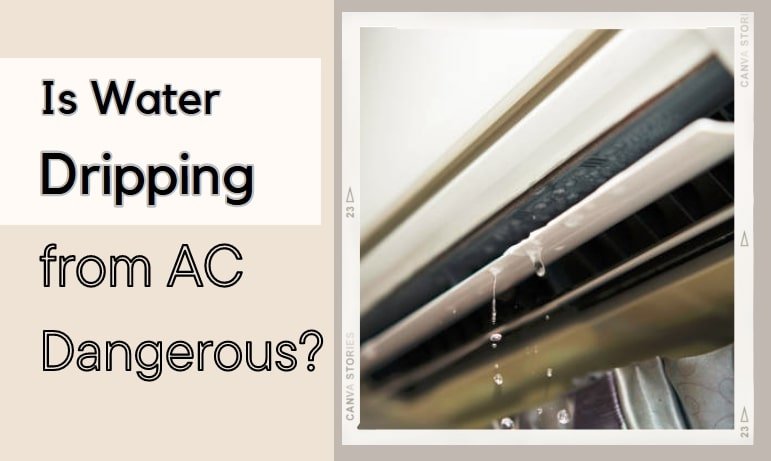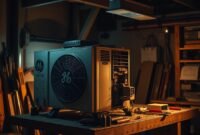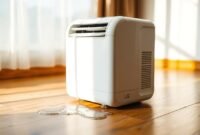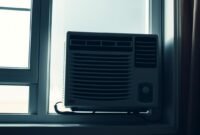Ever seen water dripping from your air conditioner and worried? Many homeowners are unsure if an ac water leak is normal or dangerous. Seeing water can make you think about damage and safety.
It’s important to know if water dripping from ac is a problem. Some water is okay, but too much could mean trouble. It might harm your home or AC system.
I’ll explain the risks, what causes leaks, and when to worry about moisture from your air conditioner.

Understanding Why Your AC Drips Water
Every air conditioning unit has a cool process that makes moisture. Warm air coming into your AC system does something amazing. It meets cold surfaces, creating a way to remove water that cools your home.
The condensation in an air conditioning unit is like a mini weather system. Warm air hits the cold evaporator coils, making water droplets form. This is like dew on grass in the morning. These ac moisture problems are a normal part of cooling your home.
How Condensation Works
Here’s how water is made:
- Warm air enters the air conditioning unit
- Air passes over super-cold evaporator coils
- Moisture in the air condenses into water droplets
- Water collects in a drain pan
- Liquid is redirected through a condensate drain line
Normal vs. Excessive Dripping
Not all dripping is a problem. A small, steady stream of water from your AC is usually okay. But, if there’s too much dripping, it might mean something’s wrong.
Signs of Proper Drainage
To know your AC is working right, look for these signs:
- Consistent, small water flow
- Clear drainage line
- No pooling water around the unit
- No musty odors near the AC
Knowing about water in your AC helps keep it running well. It also helps you spot problems early.
Common Causes of AC Water Leaks

When your air conditioning system starts leaking water, it can quickly become a dangerous situation. I’ve seen many cases where small problems can turn into big ones if not fixed.
Several key factors can trigger water leaks in your AC unit:
- Clogged drain line – the most frequent culprit of water accumulation
- Dirty air filters restricting airflow
- Frozen evaporator coils
- Broken condensate pump malfunction
- Improper AC installation
Read also: AC Drain Line Keeps Clogging
A clogged drain line is a big risk. When debris builds up, water can’t flow right, causing backups and overflows. This can damage your home and lead to mold growth.
| Leak Cause | Potential Damage | Repair Difficulty |
|---|---|---|
| Clogged Drain Line | Water damage, mold growth | Easy to moderate |
| Broken Condensate Pump | Complete system failure | Moderate to complex |
| Frozen Evaporator Coils | Reduced cooling efficiency | Easy to moderate |
Regular maintenance can prevent most of these issues. By keeping your drain lines clear and fixing problems early, you can avoid expensive repairs and protect your home from water damage.
Is Water Dripping from AC Dangerous?
Water leaking from your air conditioner might seem like a small issue. But, it can quickly turn into a big problem. The water might look harmless, but it can harm your home and health.
It’s important for homeowners to know the dangers. Water leaks from air conditioning units can cause more than just a puddle on the floor.
Immediate Health Concerns
Unexpected water from your AC can be dangerous right away:
- Slip and fall hazards on wet floors
- Increased humidity promoting bacterial growth
- Potential respiratory issues from damp environments
Property Damage Risks
Water leaking from your air conditioner can cause a lot of damage. It can weaken walls and floors, leave permanent stains, damage electrical systems, and lower your property’s value.
- Structural weakening of walls and floors
- Permanent water stains
- Compromised electrical systems
- Decreased property value
Long-term Safety Issues
Ignoring air conditioner water damage can lead to serious problems. Moisture can cause mold to grow, spreading through walls and ventilation. This can damage your home and harm your health.
Getting a professional to inspect and fix the issue is key. It helps protect your property and health.
The Hidden Dangers of Mold Growth
Water leaks from your air conditioning system create a perfect breeding ground for mold and mildew. These tiny organisms thrive in damp places, making indoor air quality a big concern. When moisture builds up around your AC unit, mold can grow fast.
Mold growth is a serious health risk that many overlook. The dangers of AC leaks go beyond just water damage. They can lead to serious breathing problems. People with allergies, asthma, or weak immune systems are at higher risk.
- Respiratory complications
- Allergic reactions
- Skin irritations
- Potential immune system challenges
Mold can spread quickly through your home’s air system. A single leak can contaminate many rooms, affecting air quality everywhere. Spores move easily through ducts, spreading health risks before you notice.
The worst part about mold is how fast it can grow. It can start within 24-48 hours after water exposure. A small leak can quickly become a big health risk. Regular checks and quick fixes are key to avoiding these dangers.

Keeping your home safe means staying alert. Look for moisture signs around your AC unit and watch for musty smells. Fix any water leaks right away. Your health and home depend on a dry, clean space.
Electrical Hazards and Water Damage
Water dripping from an AC unit can be very dangerous. It can cause serious electrical risks that many homeowners don’t think about. When water from an ac drip pan overflow touches electrical parts, the danger grows a lot.
Electrical systems are very sensitive to water. A dripping AC unit can lead to many dangerous situations. These can harm your home’s safety and structure.
Short Circuit Risks
Water getting into electrical systems can cause big problems. These problems can lead to:
- Sudden power cuts
- Damaged electrical panels
- Potential fire hazards
- Expensive equipment replacements
Structural Damage Concerns
Water leaks can also harm your home’s structure. Long-term moisture can weaken building materials. This can cause:
- Ceiling and wall damage
- Wood rot in structural frames
- Foundation weakening
- Higher repair costs
Prevention Methods
To keep your home safe from water-related dangers, you need to act early. Regular maintenance and quick action can help avoid risks from an ac drip pan overflow.
- Schedule annual HVAC checks
- Regularly check drainage systems
- Install water detection sensors
- Keep AC unit insulation in good shape
Knowing these risks and taking steps to prevent them can protect your home. It keeps your electrical systems and structure safe.
How to Identify Serious AC Water Problems
Spotting water issues with your air conditioner early can save you a lot of money and trouble. As an HVAC expert, I’ve seen how catching problems early can avoid big repair bills.
Water dripping from your AC might seem like no big deal. But, it can quickly turn into a serious problem. Look out for these warning signs:
- Persistent water puddles around the AC unit
- Unusual gurgling or dripping sounds
- Musty odors near the air conditioning system
- Visible water stains on walls or ceilings
- Unexplained increases in indoor humidity
If you see these signs, act fast. Here’s how to troubleshoot:
- Check the condensate drain line for blockages
- Inspect the drain pan for cracks or damage
- Verify that the unit is level and properly installed
- Look for signs of ice buildup on refrigerant lines
Some small problems you can fix yourself. But, big water issues need a pro. A skilled HVAC technician can find the root cause and stop bigger problems.
Ignoring water leaks can lead to high repair costs and health risks from mold. Always get help from an expert to keep your AC safe and working well.
Read also: AC Drain Pan Full of Water
Preventative Maintenance Tips
To keep your air conditioning system working well, you need to take care of it regularly. This care can stop expensive ac water leak problems and make your unit work better. Here are some easy ways to keep your cooling system safe and avoid condensation drip ac issues.
- Clean or replace air filters every 30-90 days
- Check condensate drain lines monthly
- Inspect the AC unit’s exterior for signs of water accumulation
- Clear debris around outdoor cooling units
- Schedule professional tune-ups annually
Knowing how your system drains water is key to avoiding leaks. I suggest making a simple maintenance checklist to keep an eye on your AC unit’s health.
| Maintenance Task | Frequency | Purpose |
|---|---|---|
| Filter Replacement | Every 30-90 days | Improve air quality and system efficiency |
| Condensate Line Cleaning | Monthly | Prevent water backup and possible leaks |
| Professional Inspection | Annually | Comprehensive system evaluation |
Professional HVAC technicians can give you detailed advice on your system’s maintenance needs. By being proactive, you’ll lower the chance of unexpected ac water leaks and make your air conditioning unit last longer.
Conclusion
Water dripping from your AC can be a sign of trouble. It’s important to watch for it and take care of it right away. Some moisture is okay, but too much can harm your home and health.
Ignoring ac moisture problems can lead to big issues. These include damage to your home’s structure, electrical problems, and mold. It’s key to check your AC often and fix any problems quickly.
If you see water leaking from your AC, don’t wait. Call a professional HVAC technician right away. This can prevent expensive fixes and keep your home safe.
Being careful and knowing the risks of water dripping from your AC is important. It helps keep your cooling system working well. Your efforts will make sure your AC runs smoothly and keeps your home comfortable and safe.


